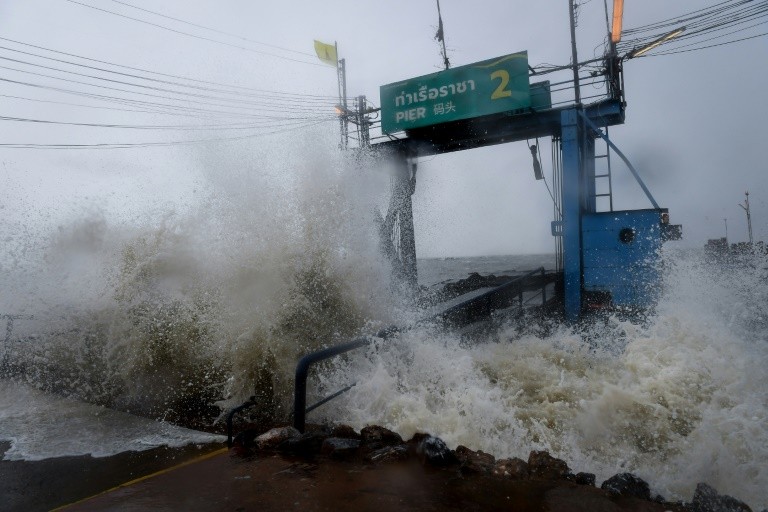Nakhon Si Thammarat (Thailand) (AFP) – Tourists marooned on Thai islands hunkered down Friday as Tropical Storm Pabuk struck the kingdom, forcing airports and ferries to close and bringing power blackouts, heavy rains and massive sea swells.
Boats were recalled to shore across the Gulf of Thailand, while three key southern airports were shut until Saturday, leaving tourists who remain on islands now cut off from the mainland.
“Ten thousand tourists are still on Koh Phangan,” said Krikkrai Songthanee, district chief of the island which neighbours Samui and is famed for its full-moon parties.
“But I talked to foreigners last night and they are not scared, they understand the situation,” he told AFP.
Meteorologists said Pabuk, the first tropical storm in decades to strike during the peak holiday season, made landfall in southern Thailand on Friday afternoon.
The eye of the storm passed over Nakhon Si Thammarat, sparing the tourist islands to the north from a direct hit.
“But all tourist islands in the Gulf of Thailand including Koh Samui, Koh Phangan, Koh Tao will be affected because Pabuk is huge,” said Phuwieng Prakhammintara, head of the Thai Meteorological Department.
It caused a power blackout across swathes of Nakhon Si Thammarat and Surat Thani provinces, authorities said, as electricity poles toppled over in high winds and power lines were cut by falling trees.
Earlier as it churned through the Gulf of Thailand, Pabuk stirred huge waves up to five metres high (16 feet).
Social media videos showed oil rigs being battered by waves, and tankers navigating terrifying walls of water.
– Empty shops, beaches –
A fisherman in Pattani province, near the Malaysia border, died after waves smashed into his boat before dawn on Friday as it returned to dock. Another crew member is missing.
They join the only other confirmed fatality from Pabuk so far — a Russian man who drowned off Koh Samui on Wednesday after ignoring warnings not to go into the sea.
By late Friday afternoon Pabuk — which means giant catfish in Lao — began to edge across the narrow neck of land between the Gulf of Thailand and into the Andaman Sea, home to the tourist resorts of Phuket and the Similan National Park, a diving paradise.
Tens of thousands of tourists have already fled the southern zone.
“It’s very empty… the beaches are deserted,” Pui Suriwan, a Koh Phangan resident, told AFP.
On neighbouring Koh Tao, one of Southeast Asia’s most popular dive spots, tourists and residents were bracing for a torrid 24 hours ahead.
“I’ve finished buying supplies… there’s no gas anywhere on the island, 7/11 is already running out of things,” a Spanish dive instructor told AFP.
“We’re ready to bunker down.”
Holidaymakers on Koh Samui, whose airport was shut all Friday, shared videos on Twitter of waves licking the steps to beachside bungalows as the wind speeds picked up.
The storm is bad news for Thailand’s lucrative peak holiday season.
The economy is heavily reliant on tourism, with latest figures for 2017 showing the kingdom made nearly $60 billion from the sector.
Tourism was hit hard by a boat accident in Phuket in July last year, when scores of Chinese tourists died as their overcrowded vessel capsized in heavy seas.
Visitor numbers from China, Thailand’s biggest market, slumped after the accident. Still, around 40 million people are expected to visit Thailand this year.
burs-apj/kaf
